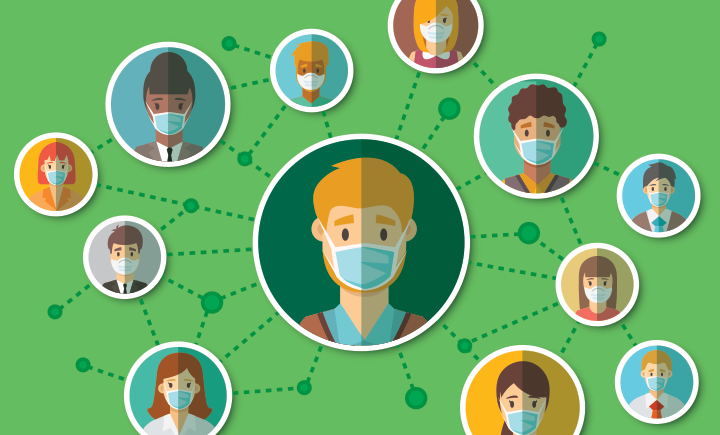Contact tracing is all in a day’s work for these public health students

Cindy Courtney and Ted Vanluvender ’17 have become experts at delivering messages most people don’t want to hear — that they’ve been exposed to someone with COVID-19.
The two students in Binghamton University’s Master of Public Health program have been working as contact tracers for the Broome County Public Health Department (BCHD) since fall as part of their required internship practicum.
“The most rewarding part of being a contact tracer is knowing that I’m helping in some way to slow the spread of COVID-19,” said Vanluvender, who earned a degree in integrative neuroscience from Harpur College and works part-time as a medical assistant for Ascension Lourdes Urology.
In contact tracing, public health case investigators work with an individual who tests positive for COVID-19 to help them recall everyone with whom they have had close contact (less than 6 feet for more than 10 minutes) during the timeframe while they may have been infectious. The names of these individuals — known as “contacts” — then get assigned to contact tracers.
“Contact tracing has the power of prevention,” said Courtney, a part-time instructional support assistant at the University’s surveillance testing site.
Courtney and Vanluvender get a list of individuals to contact through the BCHD’s secure database. They call the contacts from home, using University-provided software that blocks their personal phone numbers, to find out if the contacts are experiencing any symptoms, discuss available resources and explain the need for the contact to quarantine for 10 days from date of exposure. They also answer any questions the contact has and encourage them to reach out to the BCHD with any concerns.
“One of the most important things we do during the call is offer social support, whether it be help with grocery deliveries or arranging for the individual to talk with trained professionals about feelings of anxiety or depression during this time,” Courtney said.
A script from the BCHD helps guide the contact tracers’ conversations. In addition, before they ever made their first call, Courtney and Vanluvender received extensive training including psychological first aid and confidentiality of patient health information.
The students document their entire contact interactions in the secure database and can get assistance from BCHD personnel at any time.
“Having the Binghamton University MPH students working with us during the pandemic has been extremely valuable,” said Mary McFadden, deputy director of the Broome County Health Department. “These students have been taught about the essential responsibilities of public health and bring a unique skill set with them that is very intuitive and applicable to our local health department’s needs during this unprecedented time.”
While reaching a contact (contact tracers must call the contact three times: in the morning, afternoon and evening over the course of two days) can be difficult, getting the contact to answer the phone is sometimes just the beginning of the challenges contact tracers face.
“There are some individuals who are unwilling to cooperate with contact tracers,” Courtney said. “It’s rare, but it happens.”
“The hardest part of the job is dealing with people who are angry that they have to quarantine,” Vanluvender added. “Understandably, people are frustrated that they have to stay home for 10 days and they often take their frustration out on us. Sometimes it’s hard to calm the person down during the call.”
When contacts are difficult, Courtney said it helps to remember their purpose: “Our job is to stop the spread of COVID-19 and keep the contact and the community safe and healthy.”
“As the students have experienced, communicating health information is not always easy and this experience has taught them how to conduct epidemiologic investigations and communicate effectively as members of a pandemic response team,” said Yvonne Johnston, professor and founding director of the MPH program, as well as a nurse practitioner with the BCHD. “We couldn’t be more proud of their work on behalf of our community.”
The students will continue as contact tracers for BCHD during the spring semester, while also training to become case investigators. Both students will graduate from the Master of Public Health program in May 2021.
“We hope this ’hands-on’ experience has brought [the MPH students] more depth, knowledge and understanding of the critical role public health plays in order to promote, protect and preserve the health of a community,” said McFadden.
“The MPH program at Binghamton University provides students with opportunities to engage in active learning experiences and to develop real-world skills that improve peoples’ lives and contribute to community well-being,” added Johnston.
Following graduation, Courtney and Vanluvender hope to continue making a positive impact in healthcare. And, while their future paths will take them in different directions, they both believe the MPH program was the right choice to help them achieve their professional goals.
“I decided to get an MPH because I am interested in preventive healthcare and addressing health at the population level,” Courtney said. “After graduating, I intend to continue my passion for addressing health disparities and, more specifically, barriers to vaccinations. I hope to bring more awareness to these issues to create healthier communities in underserved areas.”
“I will be starting school to become a physician assistant in May after graduation,” Vanluvender said. “I think the MPH will help me look at my patients’ health from a different perspective, such as looking at other factors contributing to a disease instead of just trying to treat the disease itself. I think MPH gives a great understanding of health looking at the larger picture.”

